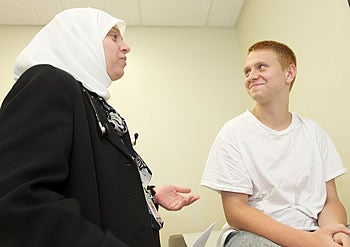New doctors boost children’s kidney transplants
Fifteen-year-old Dakota Widdows of Swansboro has a new kidney and a new outlook on life.
Thanks to a renewed transplant program at East Carolina University and Pitt County Memorial Hospital, he’s likely the first of many young people in eastern North Carolina who will get a second chance thanks to a new organ.

Dr. Baseema Dibas talks with Dakota Widdows, 15, who received a new kidney last month. Photo by Cliff Hollis
Dakota was diagnosed with kidney disease five years ago after a doctor visit following the flu.
“He said his side was really hurting, so I said, ‘Come on, let’s go to the doctor,'” said his stepfather, Dennis Jackson. On a hunch, the physician performed a test, and the results showed Dakota had 18 percent kidney function.
“Next thing you know, they called us and said his kidneys were shutting down and get him to the hospital,” said his mother, Jamie Jackson. It was the week before Christmas. “It was actually a miracle we even found out about it. His kidneys could have shut down, and he could have died,” she said.
The transplant took place in May, thanks to a kidney from his aunt – and to a pair of pediatric kidney specialists who recently joined the faculty of the Brody School of Medicine, Drs. Guillermo Hidalgo and Baseema Dibas.
In North Carolina, more than 400 children, adolescents and young adults have end-stage renal disease, the most severe stage of chronic kidney disease, according to the National Institutes of Health. From 1988 to 2007, 365 pediatric kidney transplants were performed in North Carolina, according to the Organ Procurement and Transplantation Network.
A successful pediatric transplant program not only requires transplant surgeons but also pediatric nephrologists to oversee the medical care before and after transplant, along with urologists who assist with the surgery.
With the additional surgeons and specialists, ECU plans to perform six to 10 pediatric kidney transplants a year.
“There’s probably no population that benefits more from kidney transplants than pediatric patients,” said Dr. Robert Harland, a transplant surgeon who arrived at ECU in late 2009 from the University of Chicago Medical School. Healthy kidneys improve children’s growth, socialization and academic performance, he said.
“So having a kidney transplant program, it gives them a second chance at life,” said Hidalgo, who came to ECU this year from the University of Illinois in Chicago.
Kidneys usually fail in children due to a congenital abnormality, as was the case with Dakota. They can also fail due to vesicoureteral reflux, or the abnormal flow of urine from the bladder back into the ureters due to a number of factors. That reflux can cause infections that can permanently damage kidneys.
Since a transplant involves taking medicine to suppress the immune system and ward off rejection, the Jacksons had to quickly remodel their home. Dakota had shared a bedroom with his two brothers, but would need his own once he had a new kidney. The Jacksons also had to take up carpet and replace it with laminate flooring to reduce dust.
To prevent rejection, he now takes 30 pills and other medication daily. Other than that, there’s little indication he was ever sick. He drinks plenty of water.
“I just noticed he sprang back real quick-like, and I couldn’t even tell he had surgery,” his stepfather said.
Dakota, a quiet 10th-grader at Swansboro High School, finished his schoolwork via the teleconferencing software Skype and maintained his A and B average. He’ll return to school in the fall.
“He’s the perfect patient for us,” said Dibas, the pediatric nephrologist. She joined ECU this year after completing a fellowship in pediatric nephrology at Children’s Hospital Mercy Hospital in Kansas City, Mo.
Pediatric kidney transplants have a long history at ECU. The first organ transplant done at the medical center was a 1981 kidney transplant on a 16-year-old Winterville resident. Between 1992 and 2009, ECU surgeons performed kidney transplants on 23 patients who were under age 16 and four under age 5, with the youngest being 2. The arrivals of Hidalgo and Dibas along with transplant surgeons Harland and Dr. Jason Rolls have meant transplants can take off again.
“It is a program which I have wanted to expand but without pediatric nephrology could not do so,” said Dr. Carl Haisch, a transplant surgeon and professor at the Brody School of Medicine and former director of the transplant program. “Now that we have that part of the program, we should be able to expand, and I’m delighted.”